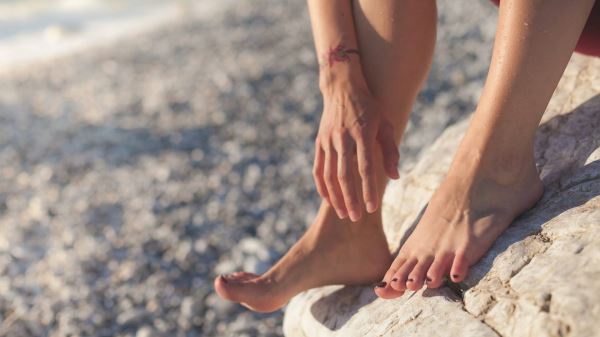Top Tips for Taking Care of Your Feet and Toenails
Why Should I Take Care of My Feet and Toenails?
Foot care is essential to a good quality of life. Just as you brush your teeth daily, wash your hands often, and make sure your hair is clean and trimmed, you should also make your feet a priority. Neglecting your feet can have painful and inconvenient repercussions.
Poor hygiene and care can cause various issues, especially for diabetics. To ensure you are taking care of your feet properly, we put together some tips to help ensure the longevity and health of your feet.
Maintaining Good Foot Hygiene
First and foremost, making sure to keep your feet clean and your toenails tidy will prevent ingrown toenails and various fungal infections. Following these tips will help keep your feet clean and free from infections and other ailments:
- Wash your feet daily.
- Check your feet often for cuts, scrapes, or any abrasion that might allow infection to creep in. Treat the cut properly, using an antibiotic ointment. Cover the wound until new skin has grown protectively over it.
- Moisturize your feet often, but avoid putting lotion between your toes. This area should remain dry to avoid infection.
- Trim your toenails weekly with a flat toenail clipper. Then file the edge of the nail to prevent ingrown toenails.
- Wear clean, dry socks. If your feet are prone to sweating, make sure to change your socks often.
Taking Care of Your Feet
In addition to making sure your feet are clean and free from issues that cause infection, you will want to implement habits that protect them on a more physical level.
The average person walks over a thousand miles per year, and those who take up running use their feet even more than that. Thankfully, there are some things you can do to protect your feet as you move through your days.
- Wear supportive shoes that fit well. Wearing shoes that are ill-fitting or don’t provide the right support can give you blisters and irritate your feet.
- Avoid wearing flip-flops and flats for long periods of time. These shoes do not provide enough arch support and can eventually cause your arches to hurt throughout the day.
- Try to have at least two pairs of well-fitting tennis shoes. Rotating through different pairs of shoes, as opposed to wearing one pair every day until they wear out, allows them to dry out completely before wearing them a second time and also helps them last longer.
Making Good Nutrition a Priority
Diet affects every organ in the body and contributes greatly to the health of your feet. Ensuring you maintain a proper diet that supplies your bones and skin with the right vitamins, while also avoiding inflammatory foods that irritate the skin and negatively affect bone health, is all part of healthy podiatric care.
FOODS TO AVOID FOR OPTIMUM FOOT CARE
- Avoid foods high in fat - especially trans fats. These can cause inflammation in your joints, making simple tasks like walking uncomfortable.
- Drink in moderation. Excess alcohol can contribute to gout, which causes pain and swelling. It most often affects the big toe, which can make wearing shoes very painful.
- Limit sugar intake. A diet high in sugar also causes inflammation; when this affects your feet, it makes simple tasks much more difficult to complete.
FOODS TO ADD TO YOUR DIET
- Add foods that are rich in Vitamin D and Calcium. Vitamin D and Calcium are good for your bones, and considering the foot consists of 26 bones, it is prudent to consume foods that protect them.
- Increase your Vitamin C intake. Vitamin C helps prevent inflammation, which will combat a short increase in sugar/fat intake and serves as a preventative measure that gives your feet the best shot at staying healthy.
- Eat foods that have Vitamin B. Vitamin B is good for nerve health. Your feet have over 7,000 nerve endings, so it is imperative to support their health through your diet.
WHAT ABOUT SUPPLEMENTS?
You can also add these vitamins and others to your diet through supplements, but research continues to show that the human body absorbs vitamins more fully when ingested as food.
What About Corns and Calluses?
Even when you take every precaution, you still may end up with calluses or corns on your feet. A few days spent hiking or one too many barefoot trips to the pool can wreak havoc on your feet. Thankfully, there are some things you can do to help your feet heal quickly and completely.
HOW TO TREAT CALLUSES AND CORNS
Calluses are patches of dry skin that have thickened over time. If not treated, calluses can grow into larger patches and irritate the foot. Corns are different from calluses only in their location. Calluses are located on the bottom of the foot, while corns are located on top of the foot. Both respond to the same home treatments:
- Soak your feet in warm water, and then sluff away the dry, excess skin with a pumice stone. Consider adding Epsom salt to the water to help soften the skin.
- Purchase corn pads. Simply follow the directions on the package, and consider applying petroleum jelly to your foot before using the pad to help protect the healthy skin that is present near the callous.
- Apply moisturizer and leave overnight. Consider wearing cotton socks over the moisturizer to help keep in the moisture and also protect your sheets. This will help to soften the calluses and make them easier to remove with a pumice stone.
Podiatric Care Matters
While keeping your feet and toenails clean and free from infection and injury perpetuates good health for your feet, it also helps keep you active and able to maintain a healthier lifestyle overall. Additionally, infection in the foot can migrate to other areas of the body, making it harder to fight if not treated quickly. We hope these tips will help keep you happy, healthy, and able to enjoy life pain-free.
If you have any questions or concerns about podiatric care or the best way to take care of your feet to protect their longevity, don’t hesitate to reach out. Teton Foot & Ankle is ready to evaluate any and all of your foot related concerns with our team of in-house specialists.
Get in touch!
Call our office if you have any questions about what we do or to schedule an appointment.

